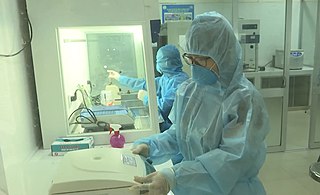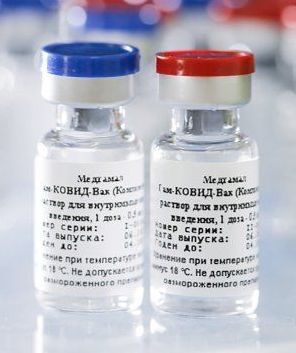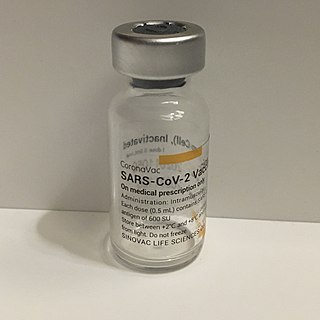CoviVac may refer to:
Sputnik 1 was the first artificial satellite, launched October 1957.
Serum Institute of India (SII) is an Indian multinational biotechnology and biopharmaceuticals company, based in Pune. It is the world's largest manufacturer of vaccines by volume. It was founded by Cyrus Poonawalla in 1966 and is a part of Cyrus Poonawalla Group.

The COVID-19 pandemic in Vietnam has resulted in 11,624,000 confirmed cases of COVID-19 and 43,206 deaths. The number of confirmed cases is the highest total in Southeast Asia, and the 13th highest in the world. Hanoi is the most affected locale with 1,649,654 confirmed cases and 1,238 deaths, followed by Ho Chi Minh City with 628,736 cases and 20,476 deaths; however, the Vietnamese Ministry of Health has estimated that the real number of cases may be four to five times higher.

Sputnik V or Gam-COVID-Vac is an adenovirus viral vector vaccine for COVID-19 developed by the Gamaleya Research Institute of Epidemiology and Microbiology in Russia. It is the world's first registered combination vector vaccine for the prevention of COVID-19, having been registered on 11 August 2020 by the Russian Ministry of Health.
The Gamaleya Research Institute of Epidemiology and Microbiology, previously the N. F. Gamaleya Federal Research Center for Epidemiology & Microbiology, is a Russian medical-research institute within the Ministry of Health of the Russian Federation.

CoronaVac, also known as the Sinovac COVID-19 vaccine, was a whole inactivated virus COVID-19 vaccine developed by the Chinese company Sinovac Biotech. It was phase III clinically trialled in Brazil, Chile, Indonesia, the Philippines, and Turkey and relies on traditional technology similar to other inactivated-virus COVID-19 vaccines, such as the Sinopharm BIBP vaccine, another Chinese vaccine, and Covaxin, an Indian vaccine. CoronaVac does not need to be frozen, and both the final product and the raw material for formulating CoronaVac can be transported refrigerated at 2–8 °C (36–46 °F), the temperatures at which flu vaccines are kept.

EpiVacCorona is a peptide-based vaccine against COVID-19 developed by the Russian VECTOR Center of Virology. The lack of protective effectiveness of EpiVacCorona, which is still in use in Russia, has been reported in scientific literature and in the media. The vaccine consists of three chemically synthesized peptides that are conjugated to a large carrier protein. This protein is a fusion product of a viral nucleocapsid protein and a bacterial MBP protein. A phase III clinical trial to show whether or not the vaccine can protect people against COVID-19 was launched in November 2020 with more than three thousand participants. The conclusions and results of the trial have not been made public.

The COVID-19 vaccination campaign in Russia is an ongoing mass immunization campaign against severe acute respiratory syndrome coronavirus 2 (SARS-CoV-2), the virus that causes coronavirus disease 2019 (COVID-19), in response to the ongoing pandemic in the country. Russia became the first country to begin a mass COVID-19 vaccination programme on 5 December 2020, starting with primarily doctors, medical workers and teachers. In January 2021, this was extended to the entire population.
CoviVac is an inactivated virus-based COVID-19 vaccine developed by the Chumakov Centre, which is an institute of the Russian Academy of Sciences. It was approved for use in Russia in February 2021, being the third COVID-19 vaccine to get approval in Russia. It obtained a permission for phase III clinical trial on 2 June 2021.
The ImmunityBio COVID-19 vaccine, codenamed hAd5, is a non replicating viral vector COVID-19 vaccine developed by the United States-based pharmaceutical company ImmunityBio.

QazCovid-in, commercially known as QazVac, is a COVID-19 vaccine developed by the Research Institute for Biological Safety Problems in Kazakhstan. QazCoVac-P is a second COVID-19 vaccine developed by the Kazakh Biosafety Research Institute and in clinical trials.

The COVID-19 vaccination in Vietnam is an ongoing immunization campaign against severe acute respiratory syndrome coronavirus 2 (SARS-CoV-2), in response to the ongoing pandemic in the country. Following the approval of the Oxford–AstraZeneca COVID-19 vaccine on 30 January 2021, vaccinations commenced on 8 March 2021, and will continue throughout the year with the goal of vaccinating 80% of the population by June 2022. The Sputnik V was later approved for use on 23 March 2021. The Sinopharm BIBP vaccine was approved for emergency use on 4 June 2021, while Pfizer–BioNTech COVID-19 vaccine, Moderna COVID-19 vaccine and Janssen COVID-19 vaccine were approved on 12 June 2021, 29 June 2021, and 15 July 2021, respectively. Vietnam approved Abdala vaccine from Center for Genetic Engineering and Biotechnology on 18 September 2021, and Covaxin from Bharat Biotech on 10 November 2021.

Vabiotech COVID-19 vaccine is a COVID-19 vaccine candidate developed by the Vaccine and Biological Production Company No. 1 (Vabiotech) in Vietnam.

NDV-HXP-S is a COVID-19 vaccine candidate developed under the leadership of Peter Palese, Adolfo García-Sastre, and Florian Krammer at the Icahn School of Medicine at Mount Sinai.
EuCorVac-19 is a COVID-19 vaccine candidate developed by EuBiologics Co.

COVID-19 vaccination in Kazakhstan is an ongoing immunization campaign against severe acute respiratory syndrome coronavirus 2 (SARS-CoV-2), the virus that causes coronavirus disease 2019 (COVID-19), in response to the ongoing pandemic in the country.

COVI-VAC is a COVID-19 vaccine developed by Codagenix, Inc. In December 2020, COVI-VAC started a Phase I clinical trial, involving 48 participants. The trial was scheduled to complete in June 2021, with results to be reported by May 2022. On September 29, 2021, Codagenix presented positive phase 1 data for COVI-VAC at IDWEEK2021. Data indicates that COVI-VAC is well tolerated, with no significant adverse events reported and that administration of the intranasal vaccine was immunogenic and capable of blocking nasal replication of the virus with minimal viral shedding, recorded at levels lower than those likely to result in subsequent transmission of COVID-19. Furthermore, COVI-VAC was shown to stimulate both serum and mucosal antibody immune responses.

ARCT-154, also known as VBC-COV19-154 in Vietnam, is a COVID-19 vaccine candidate developed by Arcturus Therapeutics. For its development, Arcturus collaborated with Vinbiocare, a Vietnamese company, for support with clinical trials and manufacturing. The vaccine was authorised in Japan in November 2023.

COVID-19 vaccine clinical research uses clinical research to establish the characteristics of COVID-19 vaccines. These characteristics include efficacy, effectiveness, and safety. As of November 2022, 40 vaccines are authorized by at least one national regulatory authority for public use: